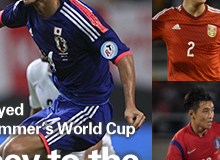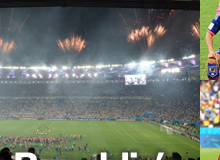Though China PR gained the championship title in the EAFF East Asian Cup 2010 and the runner up spot in the last 2013 competition, it is still playing ‘catch up’ with the continually maturing Japan and Korea REP. teams. Since its appearance in the 2002 FIFA World Cup, the team has yet to break out of the FIFA World Cup Asian qualifiers. However, in January this year the team put on an impressive performance in the AFC Asian Cup Australia 2015, giving hope for its revival. With Frenchman Alain Perrin leading the team as manager, the conventional pillars of the team have been removed to form a daring new squad. The new line-up adopts great physical ability as one of its strengths, whilst employing a comparatively polished organizational aspect – allowing the team to compete with little vulnerability. With defensive deity Wang Dalei and his phenomenal reflexes supporting the team in the rear, the whole side’s compact defense is able to halt the opposing team’s attack in higher areas of the pitch. Despite the simplicity of their offensive game, swift pass-work by Zhang Chengdong on the right and Yu Hai on the left gives the team the capability to send quick crosses in front of the goal, where the team hopes to find ace player Gao Lin. Midfielders Wu Xi and number 10 Zheng Zhi both actively participate in attack, giving the team strong finishing capabilities. With the sidebacks actively running up the field to join the attack as well, the team is also able to promptly switch between attack and defense, in a style where the player closest to the ball puts a pressure on it. Perrin is sure to test out a number of new players in the EAFF East Asian Cup 2015. There are not so many players playing in Europe like Japan or Korea REP but China PR is sure to aim for a victory as host country with a line-up centred on its AFC Asian Cup Australia 2015 team.
DPR Korea
The Democratic People’s Republic of Korea makes its return to the EAFF East Asia Cup. Since its appearance in the EAFF East Asian Cup 2008, the team progressed to 2010 FIFA World Cup South Africa for the first time in 44 years. In the AFC U-19 competitions, they won the 2010 tournament and finished as runner up in 2014. Its U-16 side won the 2010 and 2014 competitions, leaving noteworthy results at the youth football level. The national team basked in second place in 17th Asian Games INCHON 2014, and have beaten Yemen and Uzbekistan one after the other in this year’s second round of qualifiers for the 2018 FIFA World Cup Russia, placing themselves in the top of Group H. Anyone can see that the side is certainly putting on some muscle.
The person heading the team is manager Kim Chang-bok. During his playing career, he was part of the Democratic People’s Republic of Korea’s national squad. He also has experience managing the women’s national team. With an orthodox 4-4-2 formation, his side strives to play an offensive game. In the second round of 2018 FIFA World Cup Russia qualifiers Kim’s team managed to add a 4-2 win against Uzbekistan to its list of accolades. While the team has assembled the excellent midfielder So Hyon-uk and forward Jong Il-gwan from its domestic league, the side will enter the competition with their players from the J. League and Switzerland. Additionally, the team has an extended one month period for training, thanks in part to the first half of the domestic league ending in June. With such time on their hands, the side has ridden to the location of the deciding matches, Wuhan, China. They come in force and they come prepared. This side is sure to become the competition’s dark horse.
Japan
Crowned champions of the EAFF East Asian Cup 2013 Japan has, since its appointment of new manager Halilhodzic from Bosnia and Herzegovina in March, chosen footballers based on their ability to play both offensive and defensive football. The side has adamantly demanded of its players the capability to swiftly switch between attack and defense, vie for the ball, and consciously aim for the back of the opposing team’s defensive line. The results of such demands have become apparent also in the national players’ performance in their respective clubs. Matches against China PR, the DPR Korea, and Korea REP, opponents who are edging ever closer to Japan’s level of football, will prove as a touchstone for the team’s skill. As players from European leagues will not feature in the EAFF East Asian Cup 2015, the national team has the chance to play J. League footballers with few or no caps, as well as promising players from U-22 national squad. The flag bearers of the team will be midfielder Gaku Shibasaki from Kashima Antlers and Takashi Usami from Gamba Osaka, who both started in the Japan vs. Singapore match in the second qualifying round of the 2018 FIFA World Cup Russia (also the qualifier for the 2019 AFC Asian Cup), which ended in a 0-0 tie. However, newcomers such as Yuki Muto, who has been fundamental for Urawa Reds during their title-winning campaign in J. League 1st stage, are also expected to participate. Looking back on the team’s new foundations direction under manager Zaccheroni, the side entered competitions with players from the J. League and fresh faces. The side built the players’ team work and individual strengths, as well as securing victories, and some players like forward Yoichiro Kakitani, midfielder Hotaru Yamaguchi and defender Masato Morishige secured their place in the national team. As the team sets its sights on victory, all eyes are waiting to see which players will be able to show their strength to the manager.
Korea REP.
It has been a year since the team ended their winless campaign in the 2014 FIFA World Cup Brazil. The individual charged to lead the team back on its feet is the national side’s first foreign manager in seven years, Uli Stielike. The 60 year old, who played for the West Germany national team during the 1970s and 1980s, has created a team that incorporates his European expertise and vigorous observation of the new strength found in the K League. As a result, the Korea REP team finished as runners up in the AFC Asian Cup Australia 2015. Adopting a 4-2-3-1 formation as his base, his use of the right resources in the right places – regardless of a player’s fame – has given the team a style of football known as ‘practical football’. He has made high appraisals of the young players whose eyes are fixed on the 2018 FIFA World Cup Russia. Uli removed veterans Lee Dong-gook and Park Chu-young from the EAFF East Asian Cup 2015 side, and formed a team out of players born after 1987. He also handpicked players from the Rio de Janeiro Olympics generation and from the K League Challenge (national 2nd division). However, the manager does not consider this as a test team or an opportunity to develop player potential. His sound understanding of the importance of the EAFF East Asian Cup 2015 became clear when he noted: “Also in Europe the spirit of rivalry is tested against bordering countries. [In that sense] every game we play in the EAFF East Asian Cup 2015 will be crucial.” The EAFF East Asian Cup 2015 comes as a challenge that may allow the team to turn their “confidence” into “certainty.” Uli Stielike’s goal is to have his team raise the Cup for the third time after a five year wait.












